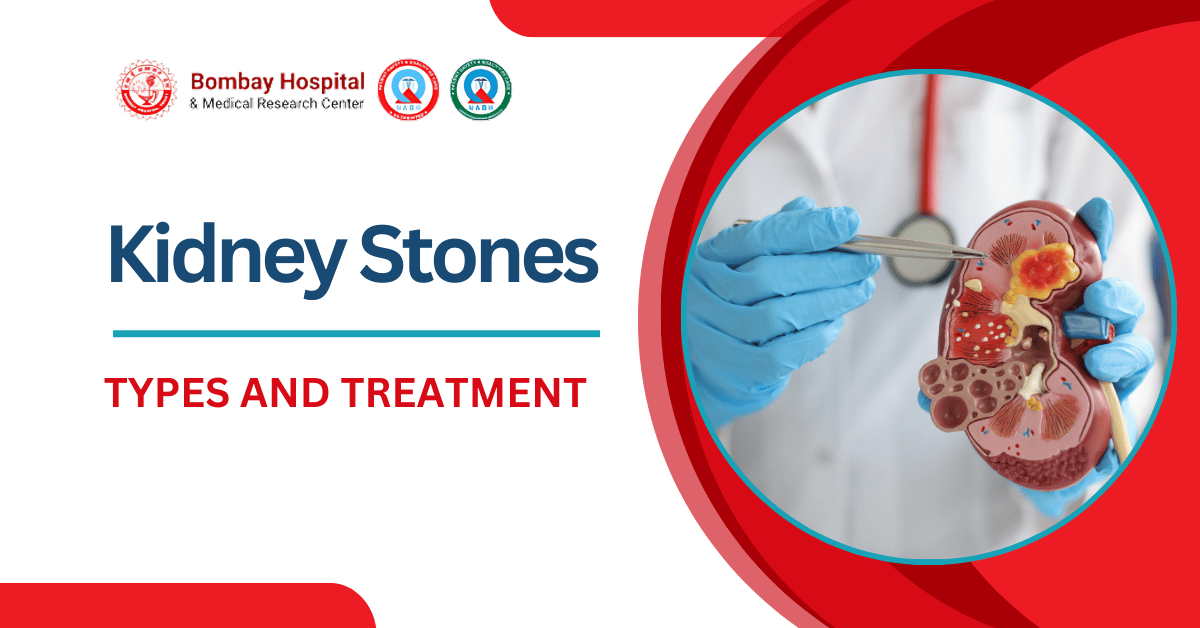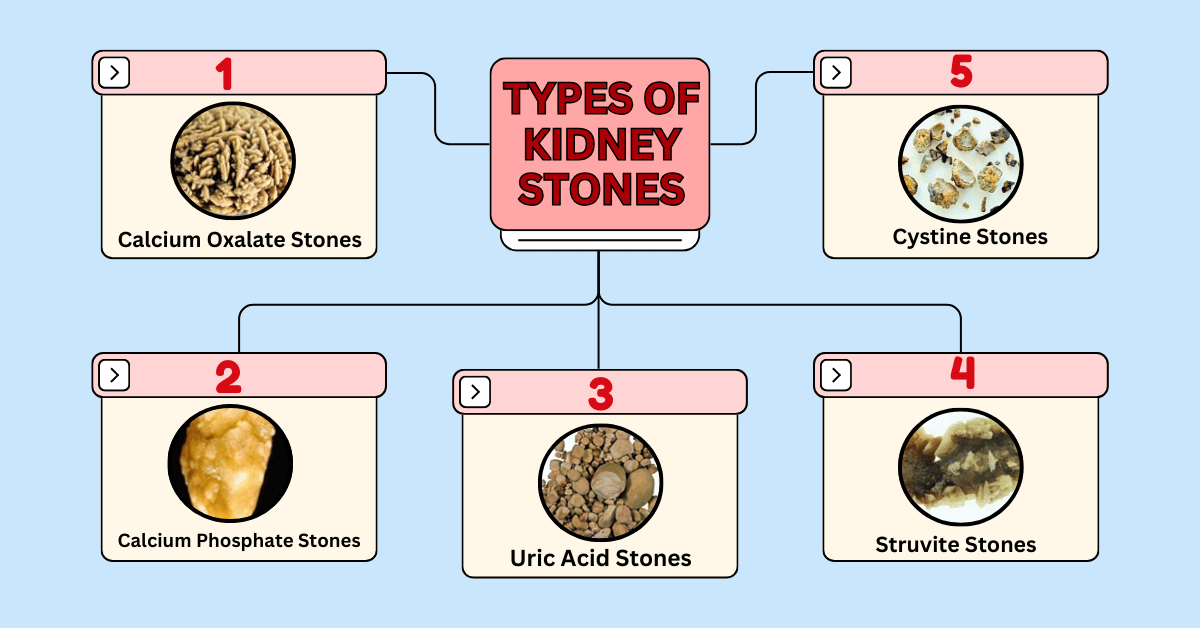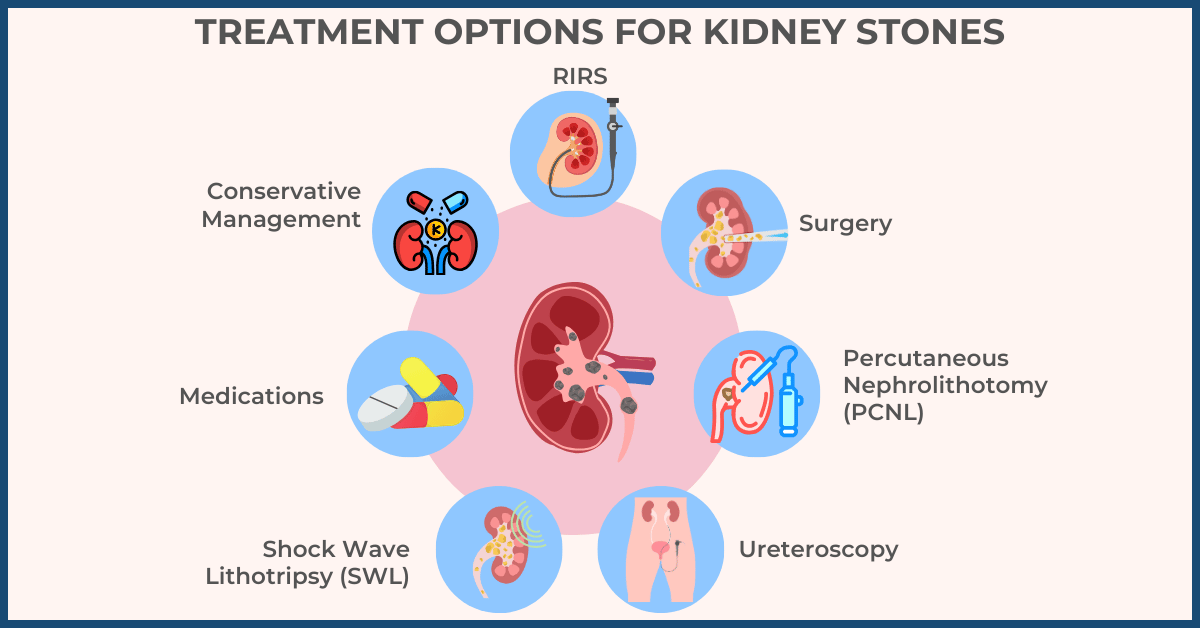Types of Kidney Stones and How They’re Treated

Kidney Stones treatment in Mumbai
Kidney stones are a common and painful condition that affects millions of people worldwide. These small, hard deposits that form inside the kidneys can vary in size and type, leading to discomfort and potential health complications if left untreated. A specialist in urology, focused on kidney care, can help identify the type of stone and recommend the best treatment. Understanding the different types of kidney stones and the treatment options available can help you take the necessary steps to prevent or manage this condition effectively.
This blog will guide you through the different types of kidney stones, their causes, symptoms, and the various treatment options available. By the end, you'll have a clearer understanding of this condition and the importance of early intervention.
Types of Kidney Stones

Calcium Oxalate Stones
These are the most common types of kidney stones. They form when calcium combines with oxalate, a substance found in certain foods like spinach, nuts, and chocolate. People with higher calcium levels in their urine or high oxalate intake are at a greater risk of developing these stones.
Prevention and Treatment
Increasing fluid intake can help flush out the stones. Doctors may also recommend reducing dietary oxalate or taking medications that prevent calcium and oxalate from forming stones.
Calcium Phosphate Stones
These stones form when calcium combines with phosphate. While less common than calcium oxalate stones, they are still a significant cause of kidney stones. They often occur in people with certain metabolic conditions or kidney problems, such as renal tubular acidosis.
Prevention and Treatment
Like calcium oxalate stones, staying hydrated is key. Additionally, medications can help manage the underlying conditions contributing to their formation.
Uric Acid Stones
Uric acid stones develop when there’s too much uric acid in the urine, a byproduct of protein metabolism. People with gout or those who consume high-protein diets are more likely to form these stones.
Prevention and Treatment
Drinking plenty of water and reducing protein intake can help. Doctors may also prescribe medications that lower uric acid levels, thus reducing the likelihood of stone formation.
Struvite Stones
These stones are often associated with urinary tract infections (UTIs). They form when bacteria in the urinary tract produce chemicals that combine with magnesium, ammonium, and phosphate to form stones.
Prevention and Treatment
Treating the underlying infection is the primary method for preventing struvite stones. In some cases, surgery may be required to remove large stones that form in response to repeated UTIs.
Cystine Stones
Cystine stones are rare and result from a genetic disorder called cystinuria. This condition causes the amino acid cystine to leak into the urine, where it can crystallize and form stones.
Prevention and Treatment
Increasing water intake is essential for cystine stone prevention. Medications that help lower cystine levels in the urine may also be recommended. In severe cases, surgery may be necessary.
Causes and Risk Factors
Several factors contribute to kidney stone formation, including:

- Dehydration: Not drinking enough fluids can lead to concentrated urine, which promotes stone formation.
- Diet: A diet high in salt, sugar, or animal protein can increase the likelihood of stone formation.
- Obesity: Obesity increases the risk of kidney stones by affecting the composition of urine.
- Medical conditions: Conditions like gout, hyperparathyroidism, or inflammatory bowel disease can increase the risk of kidney stones.
- Family history: If kidney stones run in your family, you may be at a higher risk of developing them.
Symptoms of Kidney Stones
Kidney stones can range from being painless to extremely painful. Symptoms include:
- Sharp pain in the back or side, often radiating to the groin area.
- Blood in the urine, which may appear pink, red, or brown.
- Frequent urination or a constant urge to urinate.
- Nausea and vomiting.
- Cloudy or foul-smelling urine.
If you experience any of these symptoms, it's important to seek medical attention right away to prevent complications.
Treatment Options for Kidney Stones

RIRS (Retrograde Intrarenal Surgery)
RIRS is a minimally invasive procedure used to treat kidney stones. A flexible ureteroscope is gently passed through the urinary tract to reach the kidney. The surgeon then locates the stone and uses advanced laser technology to break it into very fine fragments.
These particles are either removed during the procedure or allowed to pass naturally through urine over time.
RIRS offers quicker recovery, minimal discomfort, and no external incisions, making it a preferred treatment option for many patients with kidney stones.
Conservative Management
For small stones, your doctor may recommend drinking plenty of fluids to help flush the stone out. Pain relievers like ibuprofen or acetaminophen may also be prescribed to manage discomfort.
Medications
For certain types of stones, medications can help dissolve or prevent the stones from growing larger. For example, alpha-blockers can help relax the muscles in the ureter, making it easier to pass the stone.
Shock Wave Lithotripsy (SWL)
This non-invasive treatment uses high-energy shock waves to break large stones into smaller fragments that can be passed through the urinary tract more easily. It is a common procedure for treating larger stones.
Ureteroscopy
If the stone is stuck in the ureter, a doctor may use a thin tube, called a ureteroscope, to remove the stone or break it into smaller pieces. This procedure is typically performed under general anesthesia.
Percutaneous Nephrolithotomy (PCNL)
For very large stones, PCNL is often used. It involves making a small incision in the back and using a scope to remove the stone. This procedure is typically reserved for large or complex stones that cannot be treated with other methods.
Surgery
In rare cases, if the stone is too large to be treated with non-invasive procedures, surgery may be required. This is typically the last resort after other treatments have failed.
Lifestyle Changes to Prevent Kidney Stones
Stay Hydrated
Drinking enough water is one of the most effective ways to prevent kidney stones. Aim for at least 8-10 glasses of water a day, or enough to produce clear or light yellow urine.
Modify Your Diet
Depending on the type of stone you have, your doctor may recommend dietary changes. For example, reducing salt, oxalate-rich foods, or animal protein can help prevent stones from forming.
Exercise Regularly
Maintaining a healthy weight through regular exercise can help reduce your risk of kidney stones.
Monitor Your Urine
In some cases, your doctor may recommend periodic urine tests to check for any changes in the concentration of substances that can form kidney stones.
Consultation at Bombay Hospital, Mumbai
Bombay Hospital, Mumbai, is a trusted center for quality healthcare. It specializes in a wide range of medical fields, including cardiology, cardiovascular thoracic surgery, endocrinology, gastroenterology, nephrology, neurology, neurosurgery, pediatric surgery, plastic surgery, pulmonary medicine, rheumatology, urology, oncology, and more.
For those seeking expert consultation on kidney stones or related issues, Bombay Hospital offers a multidisciplinary approach to treatment. With its state-of-the-art medical facilities and experienced healthcare professionals, patients can expect personalized and comprehensive care.
FAQs
Conclusion
Kidney stones are a painful and often recurring condition, but with the right knowledge and treatment, they can be managed effectively. Staying hydrated, making dietary adjustments, and seeking timely medical intervention can reduce the likelihood of developing kidney stones. If you suspect you have kidney stones, it's crucial to consult with a healthcare provider to receive appropriate care and prevent complications.

